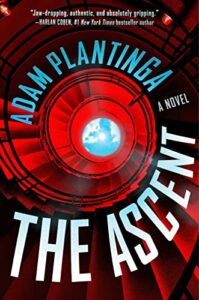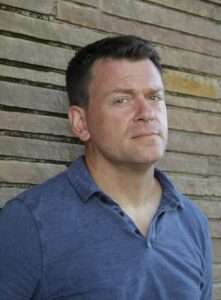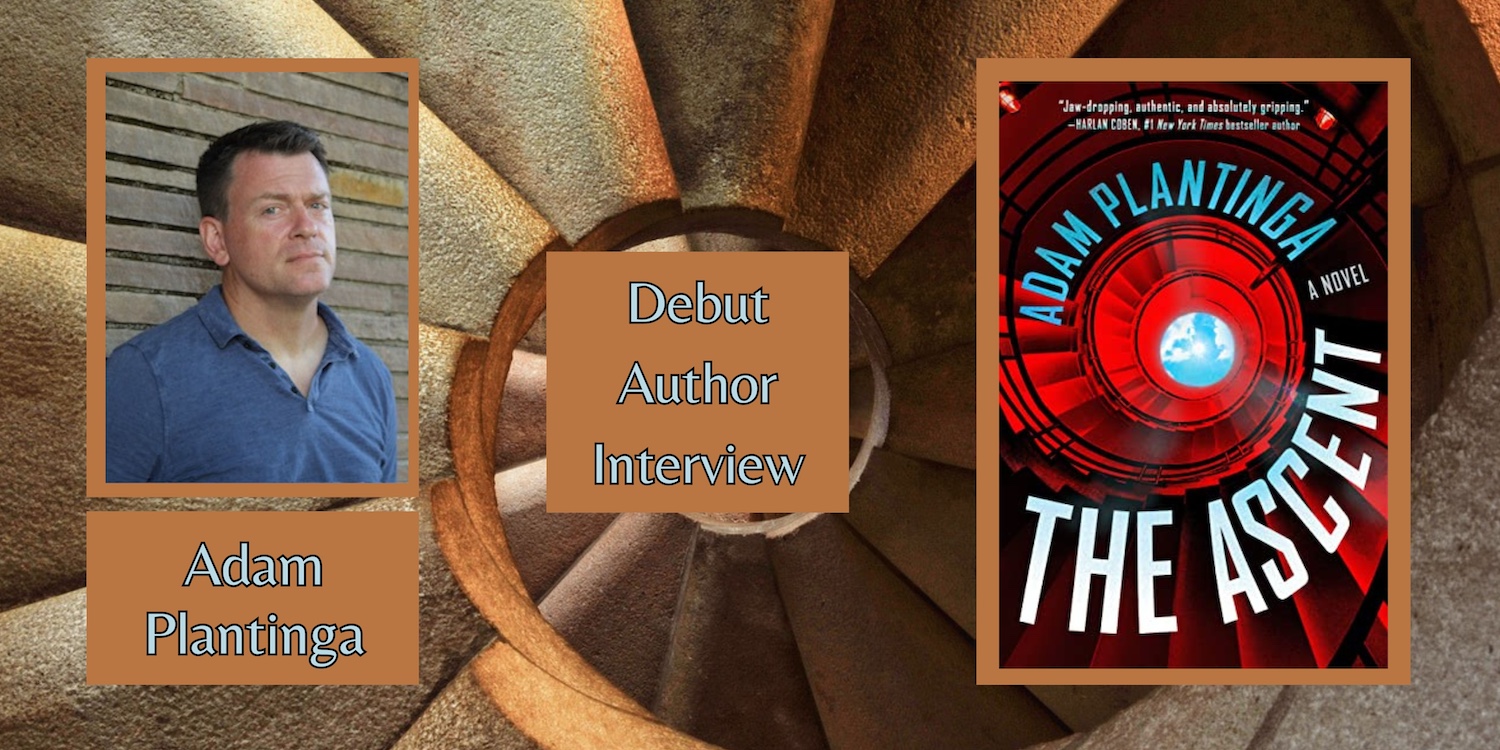The Ascent, a mystery/thriller by Adam Plantinga
Author Interview + Book and Author Info + Pet Corner!
Don’t miss any author interviews! Click the link here.
The Ascent

When a high security prison fails, a down-on-his luck cop and the governor’s daughter are going to have to team up if they’re going to escape in this “jaw-dropping, authentic, and absolutely gripping” debut thriller. (Harlan Coben, #1 New York Times bestselling author)
Kurt Argento, an ex-Detroit street cop who can’t let injustice go—and who has the fighting skills to back up his idealism.
If he sees a young girl being dragged into an alley, he’s going to rescue her and cause some damage.
When he does just that in a small corrupt Missouri town, he’s brutally beaten and thrown into a maximum-security prison.
Julie Wakefield, a grad student who happens to be the governor’s daughter, is about to take a tour of the prison. But when a malfunction in the security system releases a horde of prisoners, a fierce struggle for survival ensues.
Argento must help a small band of staff and civilians, including Julie and her two state trooper handlers, make their way from the bottom floor to the roof to safety.
All that stands in their way are six floors of the most dangerous convicts in Missouri.
To purchase The Ascent click on any of the following links: Hachette Book Group, Amazon & Barnes & Noble.
Interview with Adam Plantinga — Author of The Ascent
The Ascent features Kurt Argento and Julie Wakefield, what would you like readers to know about them?
Kurt is an embattled ex-cop from Detroit who won’t ever walk away from a fight. He’s reeling from a personal loss and is on a road trip out west with his dog when he runs afoul of a corrupt sheriff’s department in small-town Missouri and ends up in state prison.
Julie is a grad student and endurance athlete who happens to be the governor of Missouri’s daughter. She is on a field trip of that same state prison for one of her school courses. When the prison’s digital security system goes haywire, releasing a horde of dangerous inmates inside its walls, she and Kurt have to team up to escape.
The Ascent takes place in a prison. You’ve been in law enforcement for twenty-two years. How did you balance accuracy for drama? Do you take liberties with that world? Or describe situations and characters that reflect prison life?
I’ve spent plenty of time in county jails booking and interrogating prisoners, but state prison is a different animal, because once someone is sent there, the job of the police is pretty much over.
So I did some research, including sitting down with former prison warden Jim L’Etoile (who is a fine writer of fiction, by the way) and asking him about everything from prison design to inmate regulations to the threats correctional officers face.
I also took a guided tour of San Quentin. I used that to guide the narrative, because I wanted it to have an authentic skin. But I did take some dramatic liberties for the purposes of the story, as I’m told writers of fiction are allowed and even encouraged to do.
The Ascent features an ex-Detroit street cop, whereas you served in Milwaukee and San Francisco. Why did you choose to make him from Detroit?
I grew up in Michigan and always rooted for Detroit sports teams. My family still lives in the state. Also, I wanted my main character to have policed one of the toughest cities around. I figured Detroit fit the bill for that.
You have also written nonfiction about life in law enforcement: 400 Things Cops Know and Police Craft. How did the writing process differ between writing nonfiction and fiction?
Writing fiction is more freeing because I could build a story from the ground up and take it any which way I liked, although it requires a different skill set like developing pace and dialogue.
But both nonfiction and fiction involve taking raw material and organizing and shaping it in a way that connects with the reader.
What are some of the most common errors you see fiction writers make about police procedures?
Oh boy. They’re just so many. Like officers getting in a shooting and being back on the street the next day instead of being put on administrative ice while the shooting is investigated.
Or the lone detective entering an incredibly dangerous situation alone because “there’s no time for backup.”
But some of crime authors’ deviations from police procedure are understandable and even necessary. Actual police work, especially detective work, can be pretty boring. Lot of phone calls and writing up search and arrest warrants, and following leads that go nowhere and interviewing witnesses who saw nothing. And who wants to read about that?
Gimme some drama and action.
What are you working on now?
My literary agent was skilled enough to get me a two book deal so I’ve completed a sequel to The Ascent with the working title of Hard Town which is currently in the hands of my equally skilled editor.
I also tweet a lot, although they’re not all diamonds. Sometimes I just make jokes about how many knee braces I have to wear when I’m at work in the field (spoiler: it’s two, although if I had three knees, I’d probably need a third).
Words of Wisdom for Aspiring Writers
I mostly borrow other people’s wise writing advice, because I feel I’m at the starting line myself:
- From Margaret Atwood: “Writing is work. It’s also gambling. You don’t get a pension plan. Other people can help you a bit, but essentially you’re on your own. Nobody is making you do this: you chose it, so don’t whine.”
- From Neil Gaiman: “Remember: when people tell you something’s wrong or doesn’t work for them, they are almost always right. When they tell you exactly what they think is wrong and how to fix it, they are almost always wrong.”
- From Anton Chekhov: “Don’t tell me the moon is shining; show me the glint of light on broken glass.”
Author Pet Corner!

Adam Plantinga — Author of The Ascent
 Adam Plantinga’s first book, 400 Things Cops Know, was nominated for an Agatha Award and won the 2015 Silver Falchion award for best nonfiction crime reference. It was hailed as “truly excellent” by author Lee Child and deemed “the new Bible for crime writers” by The Wall Street Journal.
Adam Plantinga’s first book, 400 Things Cops Know, was nominated for an Agatha Award and won the 2015 Silver Falchion award for best nonfiction crime reference. It was hailed as “truly excellent” by author Lee Child and deemed “the new Bible for crime writers” by The Wall Street Journal.
His second book, also nonfiction, is Police Craft. Plantinga began his career in law enforcement in 2001 as a Milwaukee police officer.
He is currently a sergeant with the San Francisco Police Department assigned to street patrol. He lives in the San Francisco Bay Area with his wife, daughters, and Chow Chow named
Ziggy.
To learn more about Adam, click on either of the following links: Website, X.
Elena Taylor/Elena Hartwell

Header image from Pixabay



